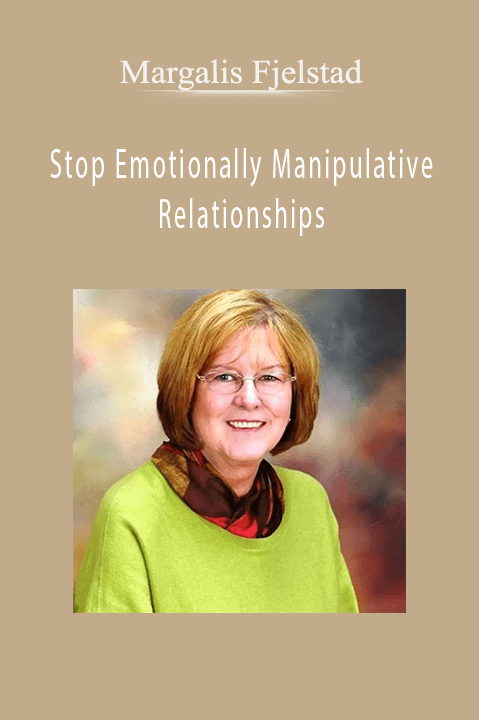Margalis Fjelstad – Stop Emotionally Manipulative Relationships
Help clients extricate themselves from emotionally manipulative relationships
Move clients from other-focused to self-focused
Stop caretakers’ self-sabotage
Challenge self-defeating behaviors, reduce anxiety and teach assertive behaviors
Narcissists and borderlines create emotional havoc in families, but they rarely come into therapy or stay in therapy to do the work that is needed. Emotional caretakers are the clients who come into therapy desperately seeking answers to the dysfunction, confusion and hurt in these families. They are the victims who are attacked, manipulated and controlled by the borderline or narcissist.
Emotional Caretakers are often described as self-sacrificing, self-defeating, enablers, doormats, virtuous masochists and pathological altruists. They are highly vulnerable to being drawn into taking care of the needs of the borderline or narcissist, because their loyalty, endurance, need to please, intense guilt, and ability to placate and take on all blame and responsibility help these relationships function.
Learn how to effectively motivate and create change in clients who typically feel defeated, defenseless and demoralized. Get Caretakers moving from denial and depression to healthy limit setting and self-care. Challenge their self-defeating behaviors, reduce their anxiety, and teach them assertive behaviors that work with the borderline or narcissist. This training will teach techniques that move these clients forward and increase their self-esteem and confidence.
OUTLINE
EMOTIONAL CARETAKERS
Who are the Emotional Caretakers?
15% or more of clients in therapy are caretakers
Are caretakers born or raised?
Strengths and vulnerabilities
Symbiotic relationship to the borderline or narcissist
Five Types of Distortions Caretakers Use
Emotional
Thought
Behavioral
Sense of Self
Relationships
Five Intensity Levels of Caretaking Relationships with the Narcissist or Borderline
Self-defeating
Pathological Altruism
Protesting Colluders
Self-Protectors
Cut Offs
The Drama Triangle of the Caretaker/Narcissist/Borderline Relationship
How and why caretakers get drawn into self-defeating relationships
The persecutor/victim/rescuer connection
TREATMENT ISSUES IN WORKING WITH CARETAKERS
Why caretakers can benefit from therapy and narcissists and borderlines typically don’t
Ten ways caretakers self-sabotage
The seven dysfunctional rules caretakers use in relationships
Caretaker issues of exterior locus of control
Passivity, fear, guilt and confusion
How these can sabotage therapy as well as relationships
TREATMENT STRATEGIES
Using CBT to confront the core distortions of caretakers
Why client centered therapy is not as effective
Dispute the caretaker’s dysfunctional relationship rules
Move caretakers out of manipulative interactions into assertive interactions
Repairing client’s sense of self
Challenging negative self-image thoughts
Teach the concept of independent SELF
Develop a clear sense of “I”
Develop an inner locus of control
Challenge caretaker’s pathological shame and guilt
Teach empowered communication techniques
Coach clients out of the Drama Triangle into the Caring Triangle
Assertiveness, conscious choice, accepting SELF-responsibility
Use group therapy to move clients forward more quickly
OBJECTIVES
Identify how to help clients extricate themselves from emotionally manipulative relationships.
Outline how to move clients from other-focused to self-focused.
Recognize and neutralize the seven dysfunctional rules caretakers use in relationships.
Recognize the causes of caretaker behavior.
Illustrate how to coach clients out of the drama triangle of enmeshment with a borderline or narcissist.
Examine various methods to stop caretaker’s self-sabotage
Outline the steps to neutralizing the emotional caretaker’s obsession with the borderline or narcissist.
Communicate to clients how to use attention and awareness to stop being manipulated.
Discuss the necessary steps to get real change happening in families with a borderline or narcissist.
ABOUT THE SPEAKER
Margalis Fjelstad, Ph.D., LMFT has had a clinical practice for the past 30 years. She specializes in educating therapists, lawyers, and case workers in the dynamics of relationships that contain a borderline or narcissist.
She has over 150 hours of training in personality disorders and concentrates on working with clients who are in a relationship with a borderline or narcissist. She has conducted over 10,000 hours of counseling with these caretaker clients, led more than 1500 hours of group therapy, and 140 training workshops. As a college professor at California State University, Sacramento, and Regis University in Colorado, she has educated thousands of students in therapeutic techniques and best counseling practices and taught 13,000 hours of graduate classes.
Her book and accompanying workbook, Stop Caretaking the Borderline or Narcissist: How to End the Drama and Get on With Life, outlines specific steps for helping caretakers stop participating in the drama dynamics of these relationships.Using her extensive experience with personality disorders, Margalis is able to take clinical concepts and bring them to life in an organized and imminently useful way. She understands the dysfunctional dynamics of the borderline and narcissist and can explain clear methods to help caretaker clients evade their manipulations and move forward.
Get Download Margalis Fjelstad – Stop Emotionally Manipulative Relationships at Offimc.click Now!
Delivery Information
- Upon ordering the product, a delivery email with download instructions will be sent immediately to you so that you may download your files. If you log in (or create an account) prior to purchase you will also be able to access your downloads from your account dashboard.
- It is a digital download, so please download the order items and save them to your hard drive. In case the link is broken for any reason, please contact us and we will resend the new download link to you.
- If you don't receive the download link, please don’t worry about that. We will update and notify you as soon as possible from 8:00 AM – 8:00 PM (UTC+8).
- Please Contact Us if there are any further questions or concerns you may have. We are always happy to assist!








6 reviews for Stop Emotionally Manipulative Relationships – Margalis Fjelstad
There are no reviews yet.